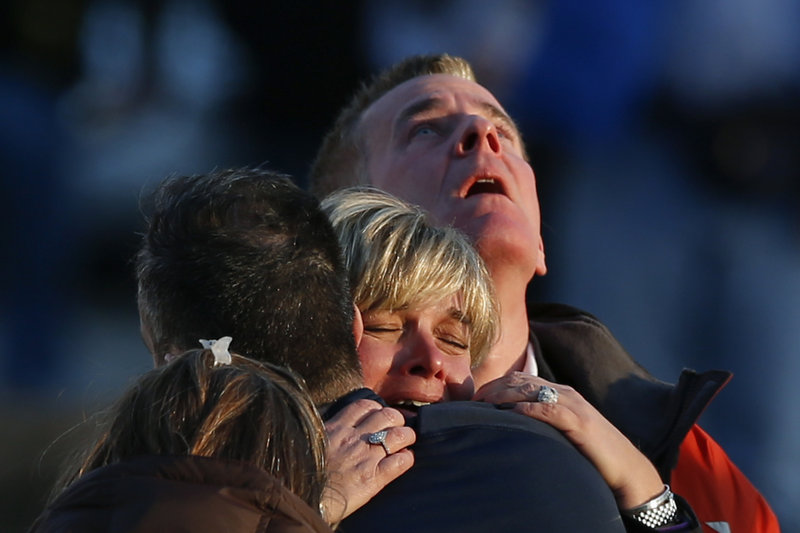“Guns don’t kill people.” “If you outlaw guns only outlaws will have guns.” “More guns, less crime.”
These bromides make good bumper stickers, but terrible public policy.
As the nation grieves over the bloodbath in Newtown, Conn., they ring even more hollow than they did before.
Guns don’t kill people? No, but a man with a gun was able to kill 27 people including six adults who would have had a chance to overpower him if he hadn’t been heavily armed enough to fire an estimated 100 rounds. This horror could not have happened without guns.
Only outlaws would have guns? The guns used in Friday’s mass murder were the legal property of the perpetrator’s mother, who could not keep them away from her emotionally disturbed son.
If she had not assembled this arsenal, he probably would not have been able to get his hands on so much destructive firepower. Outlaws are not the only danger — the easy availability of legal guns is a threat to us as well.
More guns make us safer? People who argue that ignore basic reality. We have an estimated 300 million guns circulating in our society, and we have a murder rate that outpaces any similar country in the industrial world.
Guns can be used for self-defense and defense of others, but they are only as good as people who wield them. The guns used in this massacre certainly did not protect their owner — she was the killer’s first victim. This was an example of too many guns, not too few, and any argument to the contrary is a fantasy.
EVEN IN MAINE
Maine is a rural state with a long tradition of responsible gun ownership. People here collect guns, they hunt, they protect their homes. We have a low violent crime rate and a very low barrier to gun ownership.
But that doesn’t mean we should not be part of a national effort to do everything we can to stop more families from enduring the agony faced by those in Newtown.
As President Obama said in his address at an interfaith service Sunday, “No single law, no set of laws can eliminate evil from the world or prevent every senseless act of violence in our society, but that can’t be an excuse for inaction. Surely we can do better than this.”
Three steps should be taken right away. The first should be restoring the assault weapons ban and making it harder for future mass murderers to get their hands on military-style rifles like the ones used in Newtown and a movie theater in Aurora, Colo., last summer.
These guns are too easy to buy or steal and pose too great a risk to public safety when they land in the wrong hands.
Guns that were designed to facilitate killing multiple enemies on a battlefield don’t belong in the typical American home.
The same is true for high-capacity magazines that let a shooter fire round after round without reloading. Just because most people who buy them use them responsibly doesn’t mean that these magazines shouldn’t be controlled. Too much damage can be done to treat these devices as innocent.
OTHER LIMITS
And because waiting periods and background checks save lives, we should stop exempting private sales and those made at gun shows, which combine for an estimated 40 percent of all sales, from these common-sense regulations. We also should use 40 years of learning in mental health treatment to better define the standards that would prohibit someone from buying a gun. Asking someone if they have ever been involuntarily committed to a mental hospital in an era of deinstitutionalization doesn’t probe far enough.
Other limits also make sense. There should also be limits on how many guns people can buy or how often they can buy them, to reduce the chances of them being diverted into the black market.
All of these steps could be done to make a less dangerous country without interfering with the Second Amendment’s individual rights.
The conversation should not end there. We need better community mental health treatment to help people before they reach crisis. We need to better understand how violent movies, television and video games affect children and their understanding of the world.
But as important as those reforms would be, without readily available weapons of mass destruction these crises would result in personal pain, not an occasion for national mourning like the tragedy of Newtown. It would be sadder still if we let this moment pass without taking concrete steps to stop this from happening again.
Send questions/comments to the editors.



Success. Please wait for the page to reload. If the page does not reload within 5 seconds, please refresh the page.
Enter your email and password to access comments.
Hi, to comment on stories you must . This profile is in addition to your subscription and website login.
Already have a commenting profile? .
Invalid username/password.
Please check your email to confirm and complete your registration.
Only subscribers are eligible to post comments. Please subscribe or login first for digital access. Here’s why.
Use the form below to reset your password. When you've submitted your account email, we will send an email with a reset code.